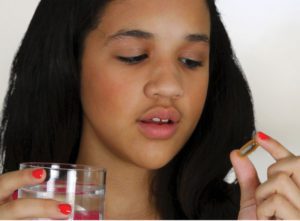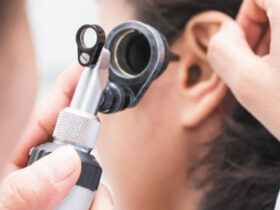From U.S. Health Resources & Services Administration
 More than 90 percent of the time, poisonings happen in people’s homes. The majority of these poisonings occur in the kitchen, bathroom and bedroom. That is why it is important to follow simple steps to prevent a poisoning from happening at home.
More than 90 percent of the time, poisonings happen in people’s homes. The majority of these poisonings occur in the kitchen, bathroom and bedroom. That is why it is important to follow simple steps to prevent a poisoning from happening at home.
Teach your family to never touch or put anything in their mouths unless they know what it is. Below are additional tips on how to keep poisonous items safe in your home. Remember, if you suspect that you or someone you know has been poisoned, immediately call the toll-free Poison Help line (1-800-222-1222), which connects you to your local poison center.
Medication Safety
• Keep medications in their original containers, properly labeled and stored appropriately. Don’t leave caps off bottles. Consider locking your medications up.
• Ask your pharmacist how you can return unused, unneeded or expired prescription drugs to pharmaceutical take-back locations for safe disposal.
Carbon Monoxide
• Have a working carbon monoxide (CO) detector in your home. The best places to locate CO detectors are near bedrooms and close to furnaces or other equipment that uses combustion to heat (dryers, water heaters).
Household Products
• Keep all products in their original containers. Do not use food containers, such as cups or bottles, to store household cleaners or other chemicals/products.
• Keep all laundry products locked up, high and out of the reach of children
Chemicals
• Keep antifreeze and all chemicals and household products in their original containers
• Read and follow all label directions and warnings carefully.
• Use recommended precautions when handling chemicals (such as rubber gloves, splash shields, masks)
Food
• Wash your hand thoroughly before and during food preparation.
• Wash all countertops and any equipment (cutting boards) being used in food preparation.
• Store food at the proper temperature. Refrigerated foods should not be left out at temperatures above 40 degrees F
• Do not let food sit out at room temperature for more than two hours.
• Use clean utensils for cooking and serving. Don’t use utensils used in handling raw food to serve.
• Watch for signs of food poisoning, which include fever, headache, diarrhea, stomach pains, nausea and vomiting.
Animals/Insects
• Know what poisonous snakes live in your area and wear proper attire when hiking outdoors.
– If you are bitten by a snake, call Poison Help right away. They can help you determine if the snake is venomous and signs and symptoms to be watched for.
• Check labels on insect repellants. Be aware that most contain DEET, which can be poisonous in large quantities.
• If you are allergic to bees, ensure you have appropriate treatment available at all times. If you are stung and experience hives, dizziness, breathing trouble or swelling around the eyes or mouth, get to the hospital immediately.
• Most spider/tick bites don’t cause harm. But if you are bitten by either, try to capture the insect. Call Poison Help which can help you determine next steps.
Poisonous Plants
• Be sure everyone in your family can identify poisonous mushrooms and plants.
• Remember when it comes to poison ivy, leaves of three, let it be.
• If you or someone you know eats an unidentified mushroom or berry, try to get a sample or photo of the plant and call Poison Help.








